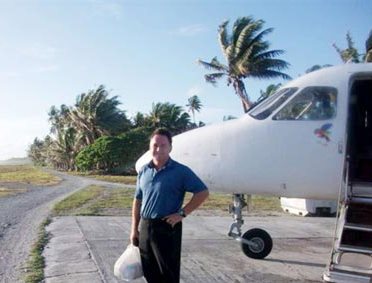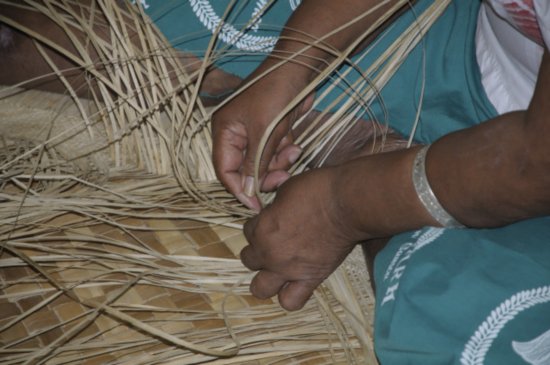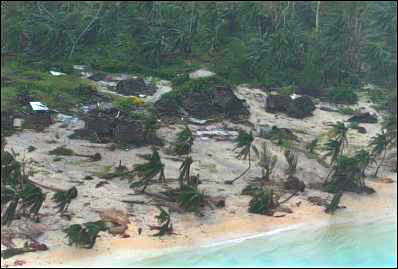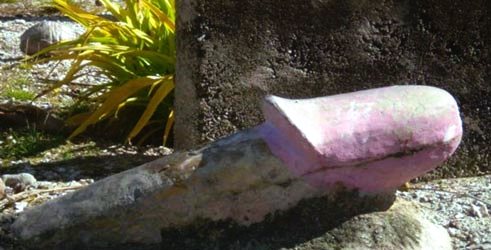
Photo: Cook Islands Tourism/Daniel Fisher

The people on Pukapuka are friendly, generous and peaceful.
They are wonderfully unique in their rugged and isolated homeland. The strong sense of familiar, social and environmental inter-connectedness is deeply embedded in the residents of the three villages of Ngake, Roto and Yato (said “Thar-toe”).
The 400 Pukapukan people live within a beautifully ordered and ancient raui system. This system allows them to leave their normal home villages and re-inhabit a customary village site in another part of the island, to live, plant and fish.
There they clean plantations, roads and paths, and sleep in Samoan-style, raised huts or “wales” (said “wah-leys”). After six months they return to their normal homes, to the comforts of running water, power, schools, telecom and SkyTV. Many of the people I met in Pukapuka seemed, to an outsider like me, to look, talk and act a bit differently than the people in any other island in the Cook Islands. Their women are famous for being assertive and bright.

The women hand-make pandanus mats with a beautiful tight weave, and take real pride in the fact that they plant and tend their own taro plantations, which in the South Pacific is normally a man’s work. It is a customary tradition there that women rule over family shares in the taro swamps, and men over other areas such as family land for buildings. The men of Pukapuka are resourceful, well-built and easy going.

The impact of Cyclone Percy
I was told that their amazing creation myth involves a warrior breaking out of a large rock and seeking his wife across the ocean. These two ancestors went on to successfully populate Pukapuka with their off-spring. Asian fishing boat visits over the decades are also said to have had contributed to the unique gene pool of Pukapuka. The island’s population then dropped from 800 to 400 after the devastating Cyclone Percy in 2005
For countless generations, the sea has been an integral part of daily life in Pukapuka, with small boats used in the same way as the family car is used elsewhere. Every day men must venture out to fish to feed their families. They return with delicious fresh crayfish, crabs, tuna, wahoo and other fish varieties from the deep, bountiful ocean surrounding Pukapuka. Depending on fuel availability, small boats are also used to drop off and pick up people and needed supplies at the airstrip or from the rare, inter-islands cargo ship
Many people I met only confirmed what I knew about Pukapukans - they love and excel at sport. Volleyball, cricket, athletics, boxing, soccer, weight-lifting, they do them all and many homes are proudly decorated with medals to prove their strong sporting abilities.
I met Tere Williams, a fit 50 year old with a shape and keen eye that attest to the fact that in his prime he represented the Cook Islands with distinction in boxing and Olympic weight-lifting. I also met a 20-year-old named Maria Tukia, who is also a national representative in many sports, while still being a devoted mother of a one year old boy and a keeper of her own taro patch.

But I was told that you have not really experienced Pukapuka unless you have done the following things: you must swim in the cool, crystal-clear lagoon at the motu and you must see “the guns”, a concrete, phallic monument on the beach at Ngake (pictured here). You must get a soft, kikau broom, and you must learn to say “Ata wai walo”, which means both “hello” and “thank you”.
As I sit in a small, open boat ferrying me across the wide, blue lagoon of Pukapuka to the rough airstrip, many thoughts cross my relaxed mind, like lazy, drifting clouds.
My short but amazing visit to “Wale-land” (said “Wah-ley”) has come to an end. After crossing the lagoon from the main village of Ngake, the boat lands at the beach at Motu Ko. We then ride in a tractor tray to the airstrip and are loaded back into the plane, after the locals give us a refreshing drinking coconut and a prayer.
I never learnt the Pukapukan word for “Good bye”. So as a traveller from Rarotonga, all that is left to say is “Kia orana Pukapuka” - long may you live on.